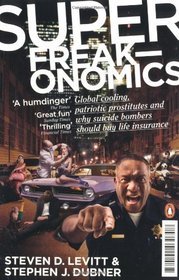It’s time to mix things up a little at Maybe The Point. We’re going to review a non-fiction book! I wouldn’t have normally bought this one, but I left my Kindle at home before a recent holiday and I was hurting for a book to read on the plane, and they don’t sell stellar fantasy at the WHSmiths in Terminal 3. Anyway. SuperFreakonomics (Steven D. Levitt & Stephen J. Dubner, 2009) is a book about economics as it applies the non-financial world. I don’t know about you, but I’ve always confused econmics for a purely financial thing. But no, that’s not the case! And SuperFreakonomics will set you straight on that.
SuperFreakonomics covers a variety of subjects from the benefits of drunk driving to the seasonal attraction of prostitution in America. Yep, SuperFreakonomics is the book equivalent of a BuzzFeed article, in a couple of ways.
The driving idea behind the novel is that ‘people respond to incentives’, which the authors realised to be the linking element between the otherwise disparate explorations of humanity’s economic underpinnings in their previous book, Freakonomics. This current endeavour continues to deliver the often unexpected and less intuitive results that arise from taking a step back from being a good, upstanding empathic person and taking on the viewpoint of a ‘cold-blooded economist’. (As so put by the authors.) Indeed, it would be difficult for anyone with an emotional attachment to their fellow human beings to consider pumping vast amounts of sulphur dioxide into the atmosphere. But that’s the very idea Levitt and Dubner cover when describing how one enterprising company is attacking global warming.
Early on, the authors explain the economic idea of an externality, or how an effort performed by one party can affect another party without any action on their part. A negative externality affects the other party in a bad way, such as causing them financial or physical harm, while a positive externality is precisely the opposite. Examining surprising externalities is a common theme throughout the book. For instance, the authors look into a fatal volcanic eruption that spewed tons of volcanic ash into the air, with the net result of temporarily causing a drop in the Earth’s temperature — a reversal of global warming, a positive externality for the world’s population. A key component of the ash? Sulphur dioxide, of course.
An example given in the book of an action that generates a negative externality is the securing of a steering wheel in one’s car. The negative externality arises from the implication given to a potential thief that this car would be difficult to steal, and that said thief would have an easier time nicking the next car along. In this case, the externality affects the owners of unsecured cars.
The book is full of these fun little tidbits of information… and not much else. I mentioned that the book is like a BuzzFeed article. That’s to say it features subjects that will definitely sound interesting, building potential appeal with a very ‘clickbait-y’ title. I mean, look at this one: “Why should suicide bombers buy life insurance?”. It just begs for an answer. But unfortunately the book provides the same level of information on the topic as your typical QI answer. In this case, it turns out that holding life insurance is a negative indicator of someone being a terrorist; which is to say that, ostensibly, having life insurance makes you less detectable by the authorities if you’re up to some heinous stuff. Ignoring the book’s vaguely irresponsible act of revealing information apparently so vital to national security, it then goes on to say that there’s a lot more to the art of terrorist detection than that, and then… That’s it, next chapter. Maybe the author’s aren’t so irresponsible after all, but it does leave you wondering why the book would even bother mentioning the good stuff at all. In all, I came away from the book feeling like I had just read a bunch of interesting summaries, but without really learning anything. Indeed, it’s almost like the book wants you to buy an actual economics textbook than teach you something that you can apply yourself.
With SuperFreakonomics, you’re paying more for entertaining writing and a few surprising insights, rather than a deep analysis of the economics behind each subject. If you wanted to actually learn in any real capacity, you’d be better served a glass of cognac, a comfy chair, and Wikipedia—or an actual book on your chosen subject, heaven forbid. But if you want to just dip your feet into the murky depths of human (and during the denouement, monkey) psychology, and read about just how hard things are when you let data alone drive your life, you might enjoy SuperFreakonomics.
— Matthew
P.S. The book’s chapter on global warming is apparently quite controversial, so don’t get your hopes up if you think someone’s figured out how to fix the dismal condition our planet’s in. But I understand the rest is pretty solid!
P.P.S. Reviewing non-fiction is kind of difficult? How am I meant to complain about character development and bad pacing? This is real life!







